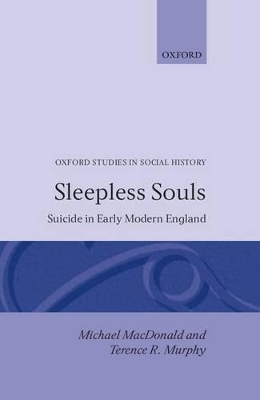Oxford Studies in Social History
1 total work
Sleepless Souls is a social and cultural history of suicide in early modern England. Self-murder was regarded as a heinous crime in Tudor and Stuart England, and was subject to savage punishments. Those who committed suicide had their property forfeited to the crown, and their bodies were denied Christian burial and desecrated. In Georgian England suicide was in practice de-criminalized, tolerated and even sentimentalized.
Michael MacDonald and Terence R. Murphy, using a wide variety of contemporary sources, especially local records, trace the causes of this dramatic change in attitude. They analyse suicide within its contemporary context, relating shifts in opinion and practice to the complex framework of life in early modern England. Political events, religious changes, philosophical fashions, conflicts between centre and localities, and differing class interests all played their part. The authors' focus on
the trauma of death by suicide uncovers the forces that were reshaping the mental outlook of different English classes and social groups. Their detailed and scholarly exploration of the `crime' of self-murder thus provides a history of social and cultural change in English society over three
centuries.
Michael MacDonald and Terence R. Murphy, using a wide variety of contemporary sources, especially local records, trace the causes of this dramatic change in attitude. They analyse suicide within its contemporary context, relating shifts in opinion and practice to the complex framework of life in early modern England. Political events, religious changes, philosophical fashions, conflicts between centre and localities, and differing class interests all played their part. The authors' focus on
the trauma of death by suicide uncovers the forces that were reshaping the mental outlook of different English classes and social groups. Their detailed and scholarly exploration of the `crime' of self-murder thus provides a history of social and cultural change in English society over three
centuries.
